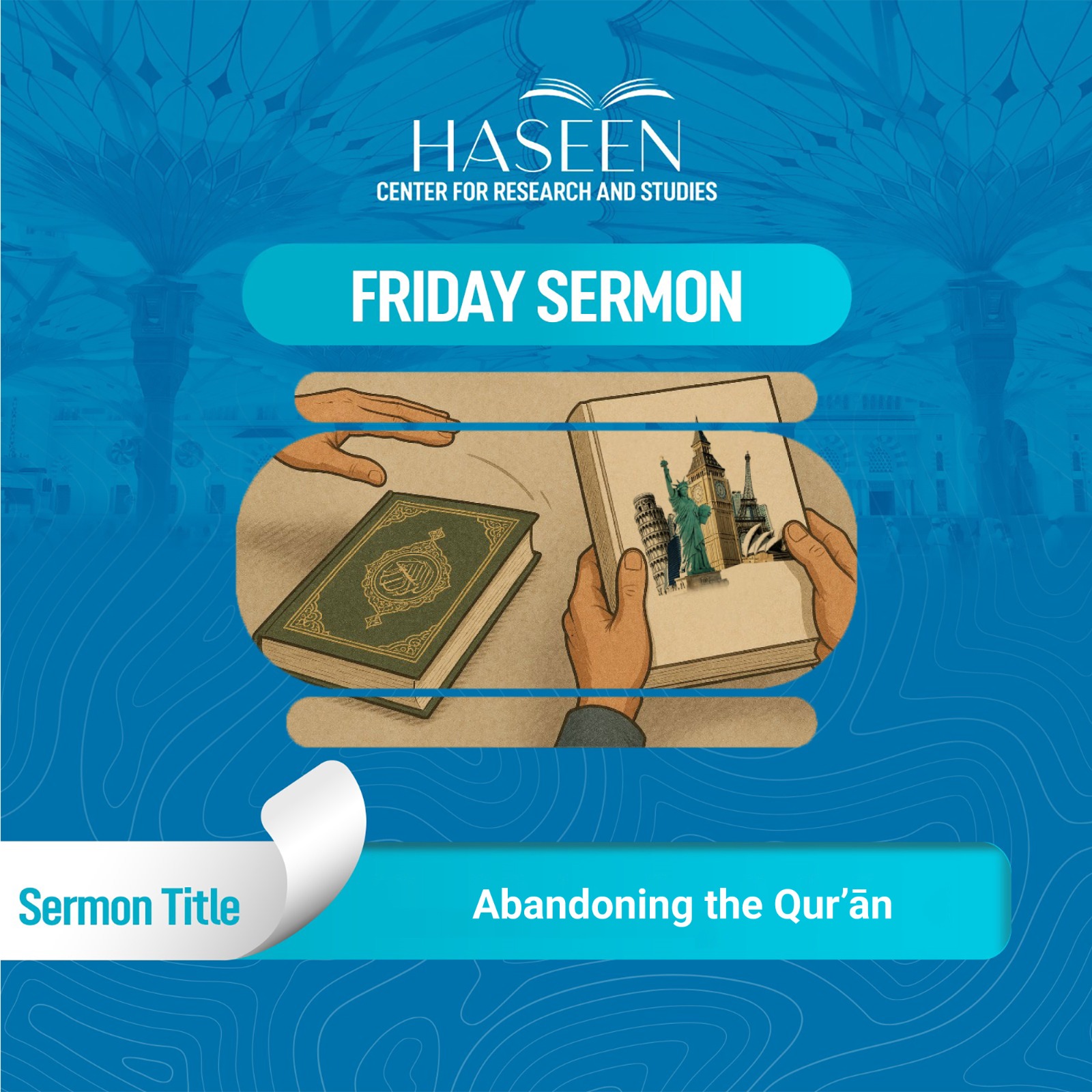Title of the Sermon: Abandoning the Qur’ān
Elements of the Sermon:
The Prophet’s ﷺ complaint to his Lord.
Forms of abandoning the Qur’ān.
Why some people abandoned the Qur’ān?.
All praise is due to Allah, who revealed the Qur’ān and made it free from any crookedness. His words are complete—true and just. I bear witness that there is no deity worthy of worship except Allah alone, and I bear witness that Muḥammad is His servant and Messenger. May Allah send abundant peace and blessings upon him.
To proceed: Fear Allah, O servants of Allah, with true taqwā, and be mindful of Him in private and in secret conversations:
يَا أَيُّهَا الَّذِينَ آمَنُوا اتَّقُوا اللَّهَ حَقَّ تُقَاتِهِ وَلَا تَمُوتُنَّ إِلَّا وَأَنْتُمْ مُسْلِمُونَ
“O you who believe, fear Allah with the fear due to Him, and do not die except as Muslims.” (Āl ʿImrān: 102)
The Prophet ﷺ used to deliver the Friday sermon while standing on the trunk of a palm tree. One day, someone said to him, “O Messenger of Allah, shall we not make a pulpit for you?” He replied, “If you wish.” So, they made a pulpit for him. On the next Friday, when the Prophet ﷺ ascended the pulpit, the trunk cried out like a weeping child. The Prophet ﷺ descended and embraced it, and it moaned like a child being calmed. Do you know why it wept?
He ﷺ said: “It was weeping because of what it used to hear of remembrance beside it.” (al-Bukhārī).
Servants of Allah,
The Book of Allah is the greatest form of remembrance—the Wise Reminder. Allah has bestowed His favor upon us by allowing us to witness the month of Ramaḍān, the month in which the Qur’ān was revealed. During this month, Muslims turned toward the Book of Allah—reciting its verses and listening attentively. Through it, Allah revived hearts, humbled souls, and brought tears to the eyes.
Yet after Ramaḍān, among the people are those whom Allah guided to remain close to the Qur’ān. It became their companion and source of comfort. They live with it and return to it again and again. They recite it from beginning to end, and when they finish, they begin anew. Their hearts are like the weeping trunk of the palm tree—or even softer.
You see them consistently attached to the Qur’ān through recitation, understanding, reflection, implementation, and seeking judgment from it. They made it their way of life, ruling by it in every affair. They cannot bear to be distant from it and are not content with anything in its place.
But among the people are also those whom the Messenger ﷺ complains about to his Lord. Do you know what the complaint of the Messenger ﷺ is? Allah says:
وَقَالَ الرَّسُولُ يَا رَبِّ إِنَّ قَوْمِي اتَّخَذُوا هَذَا الْقُرْآنَ مَهْجُورًا
“And the Messenger will say, ‘O my Lord, indeed my people have taken this Qur’ān as [something] abandoned.’” (al-Furqān: 30)
He complained to his Lord that his people had abandoned the Qur’ān, turned away from it, and neglected it until that became their normal state with the Book of Allah.
If you do not want to be among those whom the Messenger ﷺ complained about, then take heed of the forms of abandoning the Qur’ān so you may avoid them.
The greatest form of abandoning the Qur’ān is abandoning belief in it. When the disbelievers heard the Qur’ān, they openly declared, as Allah informed us:
وَقَالَ الَّذِينَ كَفَرُوا لَنْ نُؤْمِنَ بِهَذَا الْقُرْآنِ
“And those who disbelieved said, ‘We will never believe in this Qur’ān.’” (Saba’: 31)
But the important question is: What does it mean to truly believe in the Qur’ān?
Belief in the Qur’ān means to firmly believe that it is the speech of Allah. To believe that every word in it—every piece of news, every ruling, every event, every account, every verse, every sūrah—is true, full of light, guidance, mercy, a criterion, justice, and perfection.
To believe that it is a Book preserved from alteration and distortion. To believe that it is a complete way of life revealed by Allah to bring people out of darkness into light. It was revealed as a clarification, an explanation, a source of teaching, mercy, admonition, healing, reminder, and firm grounding.
It was revealed to be the judge—not to be judged. To be followed—not to follow.
Some people may believe that the Qur’ān is the speech of Allah, a sacred Book—but they strip it of authority. They veil it from impacting daily life and reality. For them, it is only a book to be revered in word and page, or merely recited for blessing. Has such a person fulfilled the obligatory belief in the Qur’ān?
Among the forms of abandoning the Qur’ān is abandoning its recitation.
Allah commanded His Prophet ﷺ to recite the Qur’ān and to do so in measured recitation. He said:
وَاتْلُ مَا أُوحِيَ إِلَيْكَ مِنْ كِتَابِ رَبِّكَ
“And recite what has been revealed to you from the Book of your Lord.” (al-Kahf: 27)
And He said:
وَرَتِّلِ الْقُرْآنَ تَرْتِيلًا
“And recite the Qur’ān with measured recitation.” (al-Muzzammil: 4)
Our Prophet ﷺ fulfilled this command. He recited the Qur’ān by night and by day, while settled and while traveling. He also advised his companions to recite it regularly. He said to ʿAbd Allāh ibn ʿAmr ibn al-ʿĀṣ (may Allah be pleased with them both): “Recite the Qur’ān once every month.” (al-Bukhārī and Muslim)
When ʿAbd Allāh ibn ʿAmr asked how often it should be recited, he was told: “In forty days.” (Abū Dāwūd)
The scholars said: This is the longest acceptable time frame to complete the Qur’ān. Anyone who exceeds this limit has fallen into some level of abandonment.
Allah has commanded every Muslim to recite whatever is easy for them of the Qur’ān—even those engaged in striving, trade, or illness. Allah said:
فَاقْرَءُوا مَا تَيَسَّرَ مِنَ الْقُرْآنِ عَلِمَ أَنْ سَيَكُونُ مِنْكُمْ مَرْضَى وَآخَرُونَ يَضْرِبُونَ فِي الْأَرْضِ يَبْتَغُونَ مِنْ فَضْلِ اللَّهِ وَآخَرُونَ يُقَاتِلُونَ فِي سَبِيلِ اللَّهِ فَاقْرَءُوا مَا تَيَسَّرَ مِنْهُ
“So, recite what is easy [for you] of the Qur’ān. He has known that there will be among you those who are ill, and others traveling through the land seeking of the bounty of Allah, and others fighting in the cause of Allah. So recite what is easy from it.” (al-Muzzammil: 20)
So, O servant of Allah, designate for yourself a regular portion (wird and ḥizb) from the Book of Allah—from its beginning to its end—so you may complete it. And do not be among the heedless.
The Messenger of Allah ﷺ said: “Whoever stands (in prayer) with ten verses will not be recorded among the heedless.” (Abū Dāwūd)
Among the forms of abandoning the Qur’ān is turning away from listening to it. The disbelievers rejected the Qur’ān and even instructed their followers to avoid it. Allah says:
لَا تَسْمَعُوا لِهَذَا الْقُرْآنِ وَالْغَوْا فِيهِ لَعَلَّكُمْ تَغْلِبُونَ
“Do not listen to this Qur’ān and speak noisily during [its recitation] so that you might overcome.” (Fuṣṣilat: 26)
As for the believer, as soon as the verses of Allah are recited to them, they lend their ears with reverence and an attentive, present heart, for this is the condition for benefitting from the Qur’ān’s reminders. Allah says:
إِنَّ فِي ذَلِكَ لَذِكْرَى لِمَنْ كَانَ لَهُ قَلْبٌ أَوْ أَلْقَى السَّمْعَ وَهُوَ شَهِيدٌ
“Indeed in that is a reminder for whoever has a heart or listens while he is present [in mind].” (Qāf: 37)
And Allah has promised mercy to those who listen attentively and give heed to the Qur’ān:
وَإِذَا قُرِئَ الْقُرْآنُ فَاسْتَمِعُوا لَهُ وَأَنْصِتُوا لَعَلَّكُمْ تُرْحَمُونَ
“And when the Qur’ān is recited, then listen to it and pay attention so that you may receive mercy.” (al-Aʿrāf: 204)
Another form of abandoning the Qur’ān is neglecting to learn it, understand it, and reflect upon it. How can one live by and be guided by the Qur’ān while being ignorant of it?
Indeed, Allah reproached the hypocrites for not reflecting upon the Qur’ān. He said:
أَفَلَا يَتَدَبَّرُونَ الْقُرْآنَ وَلَوْ كَانَ مِنْ عِنْدِ غَيْرِ اللَّهِ لَوَجَدُوا فِيهِ اخْتِلَافًا كَثِيرًا
“Do they not reflect upon the Qur’ān? Had it been from other than Allah, they would have found within it much contradiction.” (al-Nisāʾ: 82)
Knowledge of the Qur’ān and its meanings is the gateway to acting upon it. The tābiʿī Abū ʿAbd al-Raḥmān al-Sulamī (may Allah have mercy on him) said: “Those who used to teach us from among the Companions of the Prophet ﷺ informed us that they would learn ten verses from the Messenger of Allah ﷺ and would not proceed to the next ten until they had understood the knowledge and applied the actions within them. They said: ‘So we learned knowledge and action together.’” (Aḥmad)
Among the gravest forms of abandonment is neglecting to follow the Qur’ān, act upon it, and judge by it in the affairs of life. Allah says:
اتَّبِعُوا مَا أُنْزِلَ إِلَيْكُمْ
“Follow what has been revealed to you.” (al-Aʿrāf: 3)
And He says:
إِنَّا أَنْزَلْنَا إِلَيْكَ الْكِتَابَ بِالْحَقِّ لِتَحْكُمَ بَيْنَ النَّاسِ بِمَا أَرَاكَ اللَّهُ
“Indeed, We have revealed to you the Book in truth so that you may judge between people by what Allah has shown you.” (al-Nisāʾ: 105)
This is the most dangerous and widespread form of abandonment. You may see a Muslim who memorizes the Qur’ān, recites it day and night, and understands its meanings—yet the Qur’ān has no presence in their daily life. They do not act upon all of it. They selectively apply what they perceive as beneficial, focusing on worship or perhaps morals. But when it comes to verses about creed or rulings, they turn away.
They hear verses forbidding alliance with Jews and Christians and pay no heed. They hear the prohibition of usury yet act as if they never heard it. The verses of ḥijāb reach the ears of the believing woman, yet she turns away as if they were never recited. The man hears the verses of inheritance, yet he deprives his sisters of their rightful shares.
They abandon the Qur’ānic path and replace it with man-made ideologies, popular opinions, philosophies, and political strategies. This is among the gravest forms of rejection and abandonment.
Abū al-Dardāʾ (may Allah be pleased with him) said: “We were with the Messenger of Allah ﷺ, and he looked toward the sky and said: ‘This is the time when knowledge will be snatched away from the people such that they will not be able to benefit from it at all.’
Ziyād ibn Labīd al-Anṣārī said: ‘O Messenger of Allah, how will it be taken from us when we have recited the Qur’ān? By Allah, we shall continue to recite it and teach it to our women and children!’
The Prophet ﷺ said: ‘Woe to you, O Ziyād! I used to consider you among the scholars of Madīnah. Don’t you see that the Torah and the Injīl are with the Jews and Christians—yet what good did they gain from them?’” (al-Tirmidhī)
The Torah and the Gospel were among the People of the Book—but what did they do? They chose parts as they wished, altered others, and neglected much of it. Did it benefit them in the end?
Dear brothers and sisters in Islam,
Among the forms of abandoning the Qur’ān is neglecting to seek healing through it and to purify the heart by its guidance. Allah says:
يَا أَيُّهَا النَّاسُ قَدْ جَاءَتْكُمْ مَوْعِظَةٌ مِنْ رَبِّكُمْ وَشِفَاءٌ لِمَا فِي الصُّدُورِ وَهُدًى وَرَحْمَةٌ لِلْمُؤْمِنِينَ
“O mankind! There has come to you a counsel from your Lord, and a healing for what is in the breasts, and guidance and mercy for the believers.” (Yūnus: 57)
How many pains and ailments lie within our souls? In the Qur’ān is the healing for them. Allah cures hearts through it and purifies souls by its light. Yet many people, in their misery, seek healing for their spiritual ailments in the opinions, experiences, and methods of people alone. Their sickness grows, their ailments deepen, until their hearts die and their souls become sealed.
As for the believer, they approach the Qur’ān like one seeking healing. They find that it diagnoses the illness and prescribes the remedy—pure and refreshing for all who drink.
May Allah bless me and you with the Noble Qur’ān,
and benefit us with its signs and wise remembrance. I seek Allah’s forgiveness for myself and for you, so seek His forgiveness, for He is the All-Forgiving, the Most Merciful.
Second Sermon
All praise is due to Allah, and may peace and blessings be upon the Messenger of Allah, his family, his companions, and all who follow him. To proceed:
The most pressing question now is: Why have those who abandoned the Qur’ān done so?
There are two main reasons:
The first: is that they did not recognize the Qur’ān’s true worth—its majesty, its perfection, its justice, its comprehensiveness, and the purpose for which it was revealed.
The second: is that they disliked the truth contained within it. When the truth of the Qur’ān clashed with their desires, they rejected its rulings and its verses.
Reflect on the words of the Sovereign Lord, as He describes those who have turned away from His Book:
حَتَّى إِذَا أَخَذْنَا مُتْرَفِيهِمْ بِالْعَذَابِ إِذَا هُمْ يَجْأَرُونَ * لَا تَجْأَرُوا الْيَوْمَ إِنَّكُمْ مِنَّا لَا تُنْصَرُونَ * قَدْ كَانَتْ آيَاتِي تُتْلَى عَلَيْكُمْ فَكُنْتُمْ عَلَى أَعْقَابِكُمْ تَنْكِصُونَ * مُسْتَكْبِرِينَ بِهِ سَامِرًا تَهْجُرُونَ * أَفَلَمْ يَدَّبَّرُوا الْقَوْلَ أَمْ جَاءَهُمْ مَا لَمْ يَأْتِ آبَاءَهُمُ الْأَوَّلِينَ * أَمْ لَمْ يَعْرِفُوا رَسُولَهُمْ فَهُمْ لَهُ مُنْكِرُونَ * أَمْ يَقُولُونَ بِهِ جِنَّةٌ بَلْ جَاءَهُمْ بِالْحَقِّ وَأَكْثَرُهُمْ لِلْحَقِّ كَارِهُونَ
“Until when We seize their affluent ones with punishment, at once they begin to cry out. * Do not cry out today. Indeed, by Us you will not be helped. * My verses were recited to you, but you used to turn back on your heels * arrogant about it, talking nonsense by night, speaking against it. * Then have they not reflected upon the word, or has there come to them what had not come to their forefathers? * Or did they not recognize their Messenger, so they reject him? * Or do they say, ‘He is possessed’? Rather, he has brought them the truth—but most of them hate the truth.” (al-Muʾminūn: 64–70)
So if you, O servant of Allah, are among those who recognize the Qur’ān, its greatness and worth, who knows why Allah revealed it, and who loves the truth and does not follow desires—then turn wholeheartedly to the Book of your Lord.
Recite it as it deserves to be recited.
Listen attentively to its verses and give ear.
Engage with it—learn its meanings, reflect upon its verses.
Be among its people—those who act upon it, who judge by it and submit to its rulings.
Take it as a remedy and a healing—for in it is sufficiency and guidance, as Allah says:
أَوَلَمْ يَكْفِهِمْ أَنَّا أَنْزَلْنَا عَلَيْكَ الْكِتَابَ يُتْلَى عَلَيْهِمْ إِنَّ فِي ذَلِكَ لَرَحْمَةً وَذِكْرَى لِقَوْمٍ يُؤْمِنُونَ
“Is it not sufficient for them that We have sent down to you the Book which is recited to them? Indeed in that is a mercy and a reminder for a people who believe.” (al-ʿAnkabūt: 51)
O Allah, make the Qur’ān the spring of our hearts, the light of our chests, the remover of our sorrows, and the reliever of our worries.
O Allah, make us among those who venerate the Qur’ān as it deserves to be venerated, who uphold its letters, contemplate its meanings, guard its boundaries,
act upon it, and recite it as it is meant to be recited.
Do not make us among those who abandon the Qur’ān or turn away from it.
O Allah, grant victory to Islam and honor the Muslims. Destroy the criminal Jews.
Send tranquility into the hearts of those striving in Your cause.
Deliver Your oppressed servants. Raise high the banner of religion by Your strength, O Mighty, O Powerful.
O Allah, grant us safety in our lands. Rectify our leaders and those entrusted with our affairs. Grant leadership to those who fear You, are conscious of You, and seek Your pleasure.
Our Lord, grant us goodness in this world and goodness in the Hereafter, and protect us from the punishment of the Fire.










